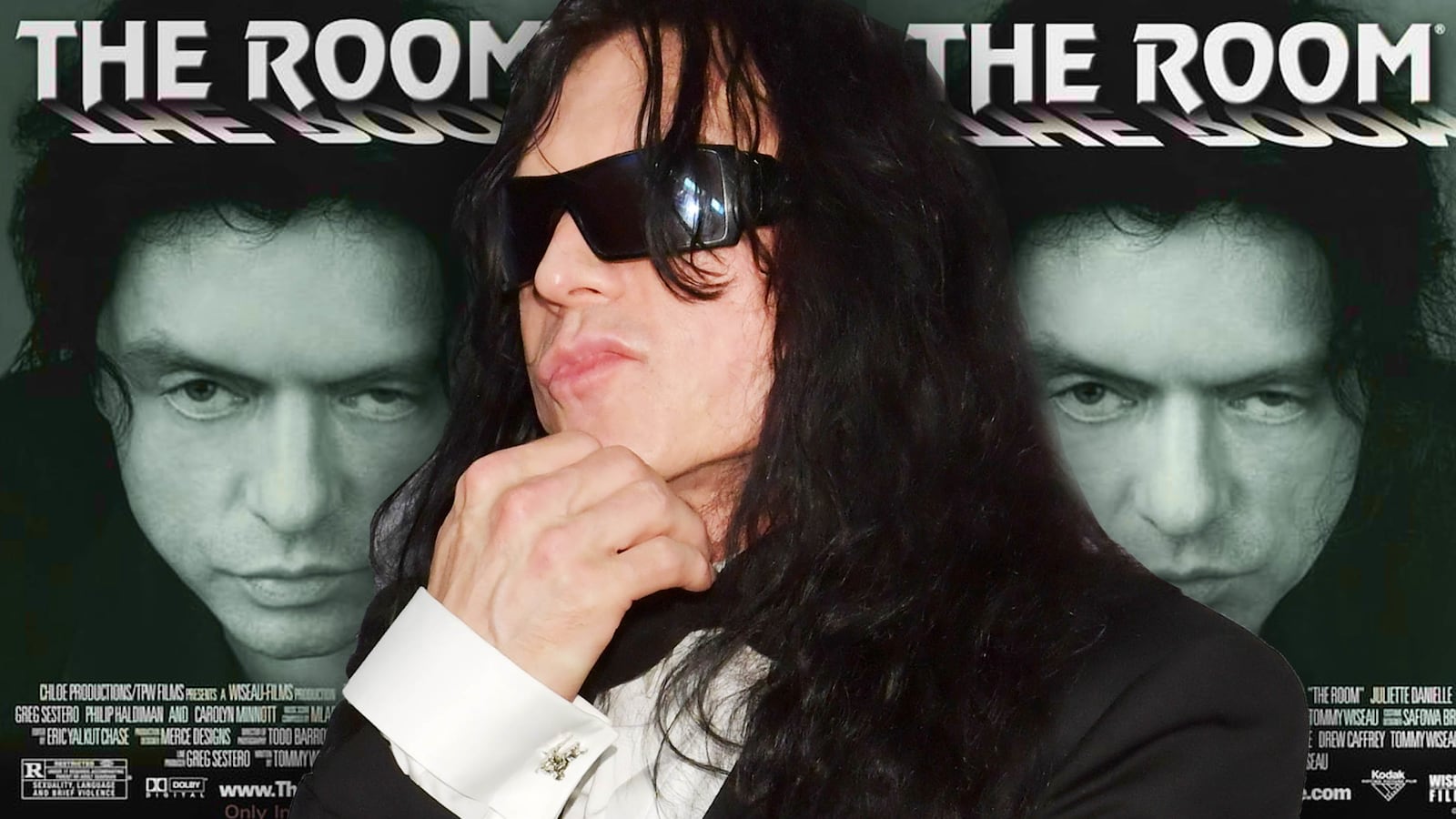For years, there were several unknowns about Tommy Wiseau, the square-jawed director of the famously demented feature, The Room. Among them were his age, his place of birth, his mysterious funding, and his dedication to wearing two studded belts straight out of Spencer’s. But one thing about Wiseau has always been clear—namely, that he approaches nearly every aspect of being alive with the same blunt shovel his movie takes to plot, continuity, or basic dialogue. “This movie doesn’t work in the way other movies work,” one theater attendant told an audience in 2010. Another was more direct: “Watching this film is like getting stabbed in the head.”
For nearly three years, a documentary crew got a front-row seat to Wiseau’s particular brand of doing things, in the form of a prolonged lawsuit in Ontario Superior Court. The case concerned a film they had made called Room Full of Spoons, about the production of The Room and its meandering ascension to cult-status, hailed as “the Citizen Kane of bad movies.” The creators—Richard Harper, Fernando Forero McGrath, and Martin Racicot—spent the years between 2011 and 2016 digging into the movie’s origins and fanbase. But they also investigated the mysteries surrounding Wiseau, its director, writer, producer, star, and sole financier. In 2017, Wiseau sued the filmmakers, claiming they had violated his “moral rights,” invaded his privacy, and breached copyright by sampling scenes from the film. He sought an injunction and got it. But later that year, the injunction was overturned.
After several years of hearing dates and delays, the case went to trial in January 2020. Late last month, Justice Paul Schabas, an Ontario judge, ruled against Wiseau, dismissing his case in its entirety and awarding the creators of Room Full of Spoons approximately $700,000 in compensatory and punitive damages. The 53-page decision, published on April 23, lays bare the three-year legal ordeal in full, and details the less-charmingly-unhinged antics of the man at the center of both movies—who, after shedding at least six lawyers because he didn’t want to pay their retainer, frequently represented himself in court.
THE MOVIE
Harper first heard of Tommy Wiseau in 2010, when he attended a screening of The Room and became, like many people, obsessed with it. Over the following year, he attended several more screenings (he has now been to at least 25, according to court documents), and eventually teamed up with two friends, Forero McGrath and Racicot, to sponsor their own event in Ottawa. There, they befriended Wiseau, who invited them to another event in Toronto and treated them to dinner. They pitched him on a documentary project about the movie and its fans, and Wiseau agreed. He proposed they start filming at an upcoming screening in New York.
But as the team prepared to travel to New York, they received an email from a man identifying himself as “John.” On behalf of Wiseau, “John” told them that the director would no longer be participating. In fact, he would not even be in New York when they arrived. (“John,” the judge wrote in his decision, “may well be Wiseau using an alias.”)
Having already spent money, Harper and his crew followed through on the trip anyways. But while shooting B-roll near the theater where The Room was to be screened, the crew stumbled upon Wiseau, sitting in a sandwich shop. This “was surprising,” the judge wrote. He was supposed to be out of town. When the crew approached, Wiseau left quickly. He “was very busy.”
Around this time, Wiseau is said to have grown concerned that Sandy Schklair, a crew member on The Room (played by Seth Rogen in The Disaster Artist) who claims he directed the movie in full, had met with Harper (as laid out by one Redditor who has chronicled the case for years). “He basically wanted me to make a two-hour promotional video for The Room, which it essentially is,” Harper told The Hollywood Reporter in 2017. “But I didn’t want to just do that. So he immediately dropped out.”
As the crew shot the film over the next few years, they investigated other aspects of Wiseau’s past, specifically the parts he had always left obscure. They traveled to Poland and interviewed his family. They identified “patient zero,” or the person credited with spreading word of the film.
Wiseau did not like what they were looking for. In one of his complaints to the court, Wiseau’s lawyer wrote that the documentary “alleged that Wiseau financed the film through drug dealing; that he had a gay relationship with Greg Sestero (one of the other actors appearing in the film); and that Wiseau was born in Poland.”
The judge who threw out his injunction disputed each claim, observing that Wiseau has frequently been requestioned about his origins and that the film never asserts Wiseau dealt drugs, but mentions it as a rumor. Regarding a sexual relationship with Sestero, the judge wrote, “the documentary makes no such allegation.”
ROADBLOCKS
Between 2015 and 2017, the documentary’s rapport with Wiseau only got worse. In early 2015, James Franco optioned The Disaster Artist, the memoir of Wiseau’s best friend and castmate Greg Sestero. The next month, according to the decision, Wiseau “began his attack,” though he had never seen the movie.
Two days after the crew launched a Kickstarter campaign for filming costs, someone called “Raul” emailed Harper demanding they remove all references to his movie (“Raul… may be an alias for [Wiseau],” the judge wrote). He filed a complaint with Kickstarter prompting the removal of their trailer. The next month, he posted the first of a three-part YouTube series called “Shame On You,” accusing the documentary of “stealing,” “illegal downloading,” and “fraud.”
After Harper and his crew completed the documentary in January of 2016, they sent Wiseau a copy. According to the decision, he complained that the film was “too negative” and “could be framed with more positivity by at least 60 percent.” He offered copyright approval in exchange for having a final say on the cut. The filmmakers refused and the movie debuted at select festivals later that year. But Wiseau only stepped up his offensive, emailing distributors and exhibitors with allegations of fraud, and sending cease and desists with threats of legal action. In September of 2016, the Sydney Underground Film Festival canceled its screening. Per the judge: “Wiseau did whatever he could to stop the release of the documentary.”
Harper and his crew planned to release Room Full of Spoons on June 1, 2017. But they postponed the debut after Wiseau threatened legal action without a two-week delay. He sued anyway and got an injunction that day. The ruling was dissolved that October. Ontario Justice Koehnen awarded the filmmakers an indemnity of around $97,000, and launched the battle that would last three more years.
THE LAWSUIT
Over the following years, Wiseau would appeal, lose his appeal, refuse to pay the settlement or provide any of his financial records, and force the case to go to trial. Once a trial date was set, he tried to postpone it several times—once on the grounds that the Ontario justice system was “stacked against foreigners and self-represented litigants.” Another time, Wiseau came to court without a lawyer and requested a dismissal on the grounds that he didn’t have a lawyer. In a transcript from the hearing, the judge explained that Wiseau had refused to pay a retainer of $25,000.
“I also told Mr. Wiseau that in my view, the $25,000 retainer that his fourth counsel requested was very low,” the judge wrote. “I would have expected counsel facing an imminent 10-day trial, for a client outside of jurisdiction, with whom they have no prior relationship to demand a retainer of somewhere between $75,000 and $150,000.”

Seth Rogen, Greg Sestero and Tommy Wiseau at The Disaster Artist premiere on November 12, 2017, in Los Angeles, California.
Charley Gallay/GettyAt other hearings, Wiseau refused to disclose his address to the judge, calling it “laughable,” and insisted all communication take place through The Room’s email address. He accused Harper and his crew of forging documents and perjuring themselves, but declined to provide evidence. He attempted to hire a lawyer who had once worked at the defense counsel’s firm. And on the Friday before trial, Wiseau requested that he be allowed to testify by videoconference. The judge refused. (“My experience with Mr. Wiseau over the last two years,” the judge wrote, “is that communication with him can be challenging.”) The next week—on the first day of trial—Wiseau never showed up.
When Wiseau finally came to court, on the third day, his evidence included eight witnesses, one of whom hadn’t known about the trial when called. Two others delivered statements that, per the judge, were “extremely short and of no real significance.” Wiseau’s primary advocate came in the form of a woman named Jeanne Marie Spicuzza, who delivered an “expert witness statement.” Spicuzza, according to the judge, appeared to have “effectively run the trial for Wiseau.”
Spicuzza described herself as a “producer, writer, director, actor, performer, fine artist, market researcher, product developer, consultant, and Chief Executive Officer at Seasons & a Muse, a seven-division entertainment company and conglomerate established in 1993.” The judge described her evidence as “not helpful.”
Three months after the trial concluded, Judge Schabas delivered his verdict. He ruled that copyright had not been violated, on the grounds that Room Full of Spoons’ clips of The Room constituted “fair dealing,” or a Canadian copyright exception for acceptable use of a work that clearly credits its original. (Wiseau did not return requests for comment; Harper said he had been advised by his lawyers not to discuss the suit). In response, Harper and his crew published the judgement on their website. “WE WON!” they wrote. Or, as an early ticket booth for The Room once read: “No Refunds!”
This article has been updated to include a Reddit user's thread on the case.


